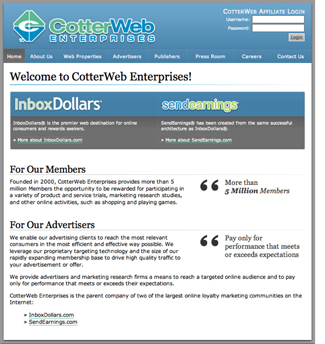 At the age of 15, Daren Cotter was presented with the opportunity to get a birthday present every soon-to-be-a-licensed-driver kid covets: a car. Instead, he asked for what he really wanted, a computer, and so young Cotter began his adventure in computing and software development.
At the age of 15, Daren Cotter was presented with the opportunity to get a birthday present every soon-to-be-a-licensed-driver kid covets: a car. Instead, he asked for what he really wanted, a computer, and so young Cotter began his adventure in computing and software development.
Within a year he started to program, creating educational games and other software to teach himself how to create in bits what was in his head, and ended up submitting it to shareware sites. Over a couple of years he pocketed somewhere in the neighborhood of $10,ooo and realized that putting his value in software was something others would pay for and a light bulb went on.
After graduating high school in 1999, he entered Minnesota State University in Mankato and was suddenly faced with a something he hadn’t expected that was life-changing: a very fast broadband connection (he’d had slow dial-up at home) and ended up investing significant amounts of time online.
Exploring, he came across AllAdvantage and joined, becoming enamored with the advertising space and the concept of receiving some sort of value in exchange for his attention and time surfing the ‘net.
He tore apart their model, their approach, and worked hard at understanding how it was delivered in an attempt to figure out how to improve upon what they’d put together (and this before AllAdvantage’s spectacular flame-out during the dotcom meltdown in the early 2,000’s).
The result of this effort was his own creation, InboxDollars, which Cotter delivered the summer after his freshman year and was the start of his company (CotterWeb, located in Mendota Heights, MN) which grossed over $12M in 2007.
 Besides the broadband connection opening up a door for young Cotter that widened his understanding and opened his mental doors to the opportunities presented by a vast Internet and Web, the availability of an open source stack of software (Linux, PHP, MySQL, sendmail) allowed him to create his company with vision, programming talent, cheap hosting and some chutzpah.
Besides the broadband connection opening up a door for young Cotter that widened his understanding and opened his mental doors to the opportunities presented by a vast Internet and Web, the availability of an open source stack of software (Linux, PHP, MySQL, sendmail) allowed him to create his company with vision, programming talent, cheap hosting and some chutzpah.
We talked about a wide range of subjects but didn’t dive deeply into any…though easily could’ve:
- What does he consider they’re doing that’s truly innovative on the Web?
- Paying consumers cash as rewards for their online activities. Others allow consumers to build points or discounts but aren’t paid.
- Advertisers choose from performance-based tiers. These are risk-based and can be as simple as a click-for-impression or click-to-conversion (the latter meaning they fulfill a transaction before the advertiser pays)
- How to keep people from gaming the system. Their model is one that, by design, only pays when a consumer actually performs.
So Cotter has built a great site and a company on a roll, used open source software, and comes across as a nice guy to boot, what were my impressions of using the site and the offering?
INITIAL IMPRESSIONS
As more and more of our privacy evaporates on the internet, even my non-tech-savvy family and friends are growing leery of handing over private data. I signed up this evening and poked around InboxDollars and saw real opportunity to perform and make money — so their value proposition is real and sound. Unfortunately, the only non-purchase payments were for things like surveys (e.g., $ .50 for one I looked at) and if a survey took 10 minutes and I only made $10 per hour flipping burgers at McDonald’s, then I’ve “lost” $1.10 ($10 per hour, divided by those six, 10-minute segments that comprise one hour = a loss of $1.10).
Surveys seemed intended to harvest personal data in order to slowly add it to a profile. Over time, such a profile can be a formidable tool for targeting ads and offers. The downside, of course, is what such aggregation can mean to our loss of privacy and, regardless of a current companies terms of service might spell out, a future acquisition might mean all terms are changed and that personal data handed over to InboxDollars can now be used in any way.
In one general survey where I could earn just that $ .50, here’s what I’d be handing over (which I wouldn’t willing give over to any site):
- Gender
- Date of Birth
- Ethnicity
- Education
- Income
- Zip
- Country
There are a whole host of Profile Surveys (coming soon) for your interests, household, home office preferences and more. With significant participation and numerous “gives” a piece at a time, the collective data profile handed over for a pittance would be profound.
I also looked at Cash Shopping and a category of tech gadgets to see what might be of interest to me. NewEgg offered a Sennheiser RS110 wireless headphones (which are awesome, by the way) for $49.99 and I’d receive an InboxDollar payback of .5%, bringing the price to $47.45. Unfortunately, a three minute Google search found several deals at $45 and $44.95 offered by reputable resellers.
While I didn’t exhaustively assess all aspects of what InboxDollars offers, suffice to say I’m not in the target market and wouldn’t see myself participating. But like Fingerhut did when they first began — targeting lower income demographics more likely to buy their quality and bargain price points — there obviously is a segment willing to play along since they’re currently serving ~4 million members!
FUTURE POSSIBILITIES?
Knowing what I do about the shift in attention, consciousness and value migrating online — and the Rise of the Participation Culture (PDF) who are always-on and always-connected — CotterWeb has an incredibly huge opportunity in front of them that is the Holy Grail of Internet advertising and marketing: to learn how to value and reward online participants, grab and keep their attention, build out a dataset of millions of “slice-n-diceable” profiles of people whom advertisers will trip all over themselves to be in front of, and do so in a meaningful way that aligns the incentives of consumers and advertisers while protecting the privacy of the former and managing risk for the latter.
I suspect that, given Mr. Cotter’s entrepreneurial spirit and creative vision, he and his team will figure out how to make that happen.